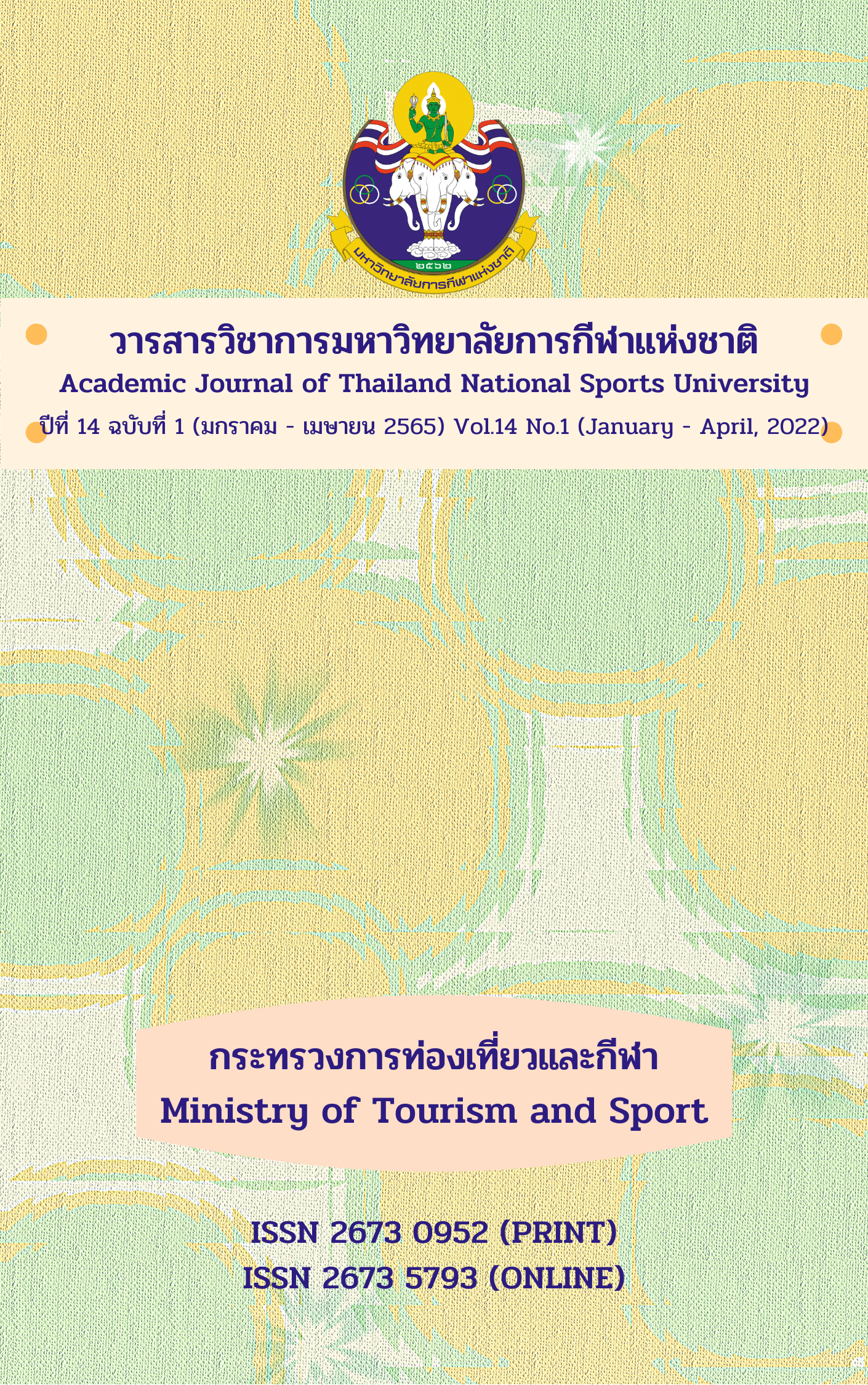THE SNACKS CONSUMPTION BEHAVIOR AFFECTING THE UNDERGRADUATE STUDENTS AT THAILAND NATIONAL SPORTS UNIVERSITY IN NORTHERN CAMPUS
Main Article Content
Abstract
The objective of this research was to study the snacks consumption behavior affecting the undergraduate students at Thailand National Sports University in Northern Campus. The sample group of this research was the undergraduate students of Thailand National Sports University in Northern Campus i.e. Chiangmai Campus, Lampang Campus, Sukhothai Campus and Phetchaboon Campus with the total of 353 students using Yamane formular. The samples were stratified randomly to avoid the drag of data collection so the researcher had to collect the data by the total of 360 students. The research instrument was the questionnaire proved by the specialist inspectors in terms of content validity and reliability to analyze the frequency distribution, Mean, percentage and standard deviation (S.D.), t - test, One - way Anova. It was found that the average of snacks consumption behavior was at a high level, and behavior of snacks consumption knowledge was found at a moderate level. In other factors such as gender, faculty of studying, body mass index were found with statistically significant difference (p > .05) and no significant differences with snacks consumption behavior were found in terms of income.It may be concluded that the frequency of snacks consumption behavior of undergraduate students may result from changing of the current eating habits which focus on the eating speed and food quantity rather than nutritional quality. Moreover, most of the samples received food and nutrition misinformation from TV advertisements which broadcast only unhealthy foods such as snacks, soft drinks and fast food.
Article Details

This work is licensed under a Creative Commons Attribution-NonCommercial-NoDerivatives 4.0 International License.
The published article is a copyright of the Academic Journal of Thailand National Sports University. The passage appeared in each article in this academic journal is a perspective of each author which is not related to the journal. Each author is required to be responsible for all components of his/her own article. If there are any mistakes, each author must be responsible for those mistakes on his/her own.
References
Anukul Phonsir. (2008). Knowledge, Attitude and food consumption behavior of Ramkhamhaeng University students. Ramkhamhaeng Research Journal, 11(1), 49-60.
Green, L. W., & Kreuter, M. W. (2005). Health program planning: An educational and ecological approach (4th ed.). New York: McGraw-Hill.
Isara Siramanirat et al. (2562). Food consumption behavior of students. Rajamangala University of Technology Thanyaburi. Journal of Community Health Development Khonkaen University, 7(2), 335 - 345.
Issara Siramaneerat et al. (2019). Food consumption behavior of students. University of Technology Rajamangala University of Technology Thanyaburi Journal of Community Health Development Khon Kaen University, 7(2).
Korada Ketmethawit. (2013). Fast food consumption behavior of students in Chiang Mai (Bachelor’s Thesis), Chiang Mai University.
Kingkarn Samrueng. (2016) Thai dessert consumption behavior among students of Pibulsongkram Rajabhat University. National Academic Conference Kamphaeng Phet Rajabhat University, 3(1), 375 - 383.
Krit Tianmittraphap (2007). Factors Influencing Customer's Purchasing Decisions on Tarini Bakery Shop Phra Nakhon Si Ayutthaya District Phra Nakhon Si Ayutthaya Province (Master’s thesis), Phranakhon Si Ayutthaya Rajabhat University.
National Statistical Office. (2017). Office of Statistics Revealing the survey of health, welfare and food consumption behavior. Retrieved from http://www.nso.go.th/
Nutrient Research, Institute Mahidol University. (2004). The Study of Sweet and Snack Consuming Behavior of Children Aged 3-15: Nutrient Research, Institute Mahidol University together with Bureau of Dental Health, Department of Health, Ministry of Health. Retrieved from http://www.sweetenough.in.th/index.php?option=com_jdownloads&Itemid=192&task=finish&cid=15&catid=4&m=0
Office of Thai Health Promotion Fund. (2014). Consume food correctly Reducing health problems in Thai people. Retrieved from http://www.thaihealth.or.th/
Phattanan Pitakum. (2011). Consumer purchasing behavior towards Thai sweets in Mueang Chiang Mai district (Master’s thesis), Chiang Mai University.
Phisanu Aphisamajarayothin. (2017). Sex and medicine: Reproductive health in dimensions of sociology. Bangkok: Triple Education.
Phuangrat Thaweerat. (1997). Research Methods in Behavioral Sciences and Social Sciences. Bangkok: Bureau of Educational Testing Psychology Srinakharinwirot University Prasarnmit.
Piyada Prasertsom et al. (2005). Snack and Drink Consuming of Thai Children Aged 3-12. Bangkok: Dental Health.
Prapaisri Sirijakkawal. (2006). Why 6 Teaspoons Of Sugar. Retrieved from http://nutrition.anamai.moph.go.th/temp/main/view.php?group=3&id=71
Purin Srisaslak. (2011). Factors Relating to Food Consumption Behavior of Nursing Students. College of Nursing Network, Central Region 2 Royal National Institute of Education (Master’s thesis), Mahidol University.
Sribang-On Suwanpanich. (2012). Factors affecting food consumption of students in the Institute of Physical Education, Krabi Campus. Academic Journal of Institute of Physical Education, 4(1), 29 - 43.
Surang Sukrod. (2015). Relationship between knowledge about food. Food consumption behavior and physical exercise behavior and over nutritional status of students at Demonstration School Srinakharinwirot Prasarnmit (Secondary Department). Srinakharinwirot Research and Development Journal (Humanities and Social Sciences), 7(13), 200 - 210.
Sureeporn Na. Bangchang. (2013). Expectation, perception, attitude, image, loyalty and behavior toward Thai desserts of consumer in Amphawa Floating Market Samutsongkhram. Journal of Thai Hospitality & Tourism, 8(1), (January – June).
Suwanna Chiangkhunthod et al. (2013). Knowledge and behavior food consumption of Pasi Charoen Person (Research report). Bangkok: Office of the Health Promotion Foundation.
Tassana Sirichot. (2012). Knowledge, attitude and behavior. Student food consumption Songkhla Rajabhat University (Research report). Songkhla Rajabhat University.
Wanida Kaewcha-Um. (2019). Junk food consumption behavior of undergraduate students in Nakhon Pathom Province: a case study of Kasetsart University and Silpakorn University (Master’s thesis), Silpakorn University.
World Health Organization. (2000). The world health report. Geneva, Switzerland: Author.
Yamane. (1973). Taro Statistic: An Introductory Analysis. New York: Harper & row.
Yotee Yothawong. (2003). Consumer buying behavior of Chiang Mai University student for dessert and snack (Master’s thesis), Chiang Mai University.


